Glacier National Park
Exploring America's Crown Jewel
Article Date: November, 2014
Article and Photography by Mark Quasius
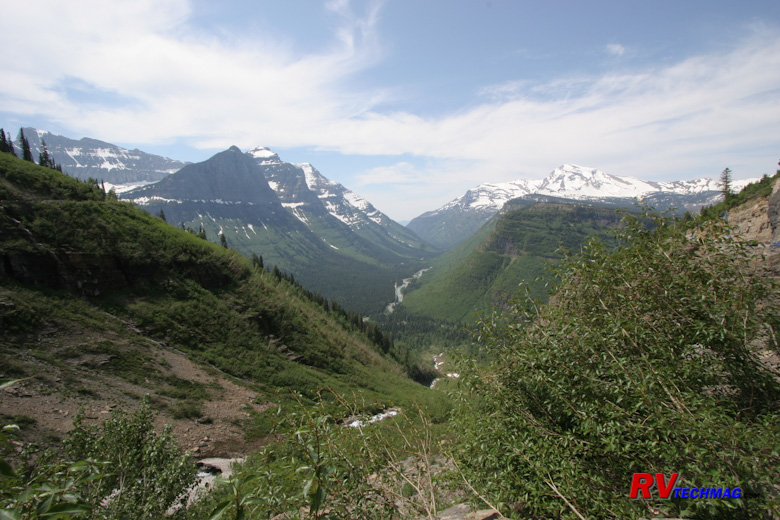
Glacier National Park is one of America's crown jewels. It is located in Montana, just south of the northern border with Canada.
In fact Glacier is half of a large park system - Glacier-Waterton International Peace Park. Canada's Waterton Lakes Park begins immediately where
Glacier ends and continues north from the border. Glacier straddles the Rocky Mountains as they cross the border. It's flanked on the west side by the
Flathead Indian reservation and on the east side by the Blackfoot Reservation.
This park is unrivaled for scenic mountain views and is packed with wildlife. Its many trails take you into the backcountry
where alpine lakes abound. This park is built in mountainous terrain and the terrain ranges from gentle mountains and valleys to near vertical cliffs.
Glacier has two major areas that flank the park and serve as base camps to use when exploring this fantastic area. West Glacier
and Apgar Village are found on the west end of the park. Visitor services include helicopter flight-seeing trips, rafting trips on the Flathead River,
and various lodging, restaurant, and RV park services. In addition, the small Apgar Village is right next to West Glacier and is located right on the
shores of Lake MacDonald. On Glacier's east end is St. Mary, another area with lodging, dining, and RV services. Connecting the two is a single road
through the park called "Going to the Sun".
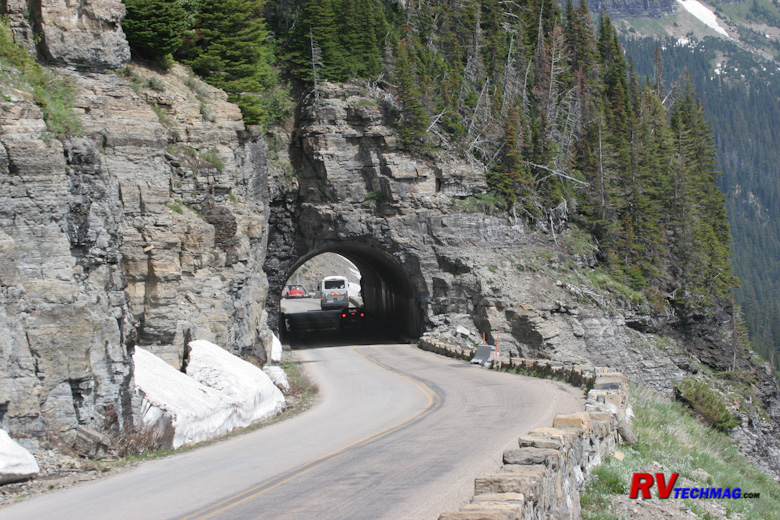
Historic Going-to-the-Sun Road clings to the side of the mountains as it traverses the park from east to west
Going to the Sun Road is an engineering marvel. Completed in 1933, it clings to the side of mountains, overlooking valleys below
and climbs to eye level with glaciers. It was designed to be architecturally invisible so as not to be a blight on the landscape. Stone masons carefully
cut and laid blocks of stone, quarried from nearby areas to create a scenic guardrail. This high alpine road generally opens in the very end of June
after all of the snow is finally cleaned away and is limited to vehicles under 21' in length due to the sharp curves. The road itself is a must-see and
one of the park's claims to fame.
But, the name of the park is Glacier and you can expect to see a number of them during your visit. Being a high country area,
there are plenty of glaciers clinging to the mountains. Many of these can be seen from Going to the Sun but there are countless others that are
accessed by numerous hiking trails. The Glaciers are receding as the global climate gradually warms every year but they are still a sight to behold.
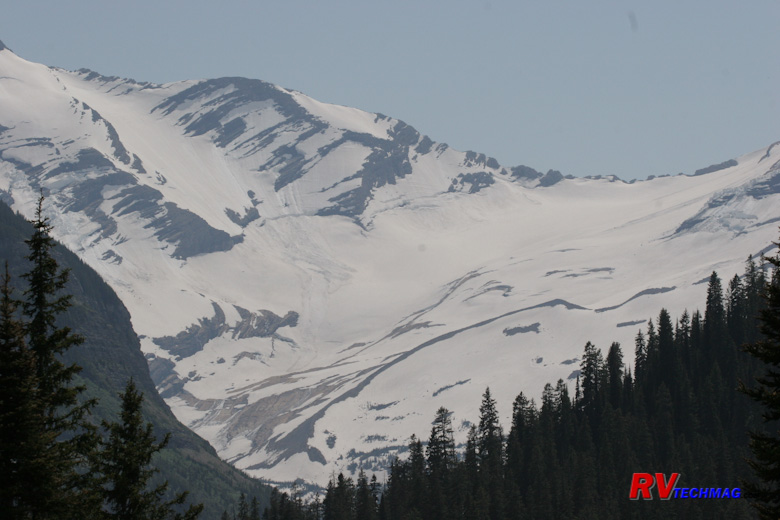
Jackson Glacier is just one of the many glaciers that can be found in the park
RV Access to Glacier
The 21' vehicle length limit on Going to the Sun road precludes taking an RV across the park. You'll need to choose your campsite
at either end and take your tow or towed vehicle to see the sites and scenery inside the park. If you need to shuttle your RV from one side to the
other you can skirt around the park's southern border on US-2. While not as spectacular as Going to the Sun, US-2 does still drive through some very
scenic areas so it's still a good option as long as you don't do it on a daily basis. There is a viewing area at Goat Lick, which is near Essex, Montana
that is capable of handling your RV. Chances are good that the mountain goats will be out nibbling on the salt in the cliffs nearby and make for an
interesting photo stop.
If your destination is the west side you can arrive from any of the four directions. US-93 southbound will bring you to Kalispell
from Canada to the north. US-2 eastbound will bring you in from Idaho's panhandle. US-93 northbound brings the majority of visitors up from interstate 90
and Yellowstone to the south. US-2 westbound will skirt around the southern edge of the park and bring you in from Browning to the east. There are a
number of full service campgrounds in West Glacier that you can select from as well as in nearby Hungry Horse, Whitefish and Kalispell. Smaller
campgrounds without hookups can be found near Apgar.
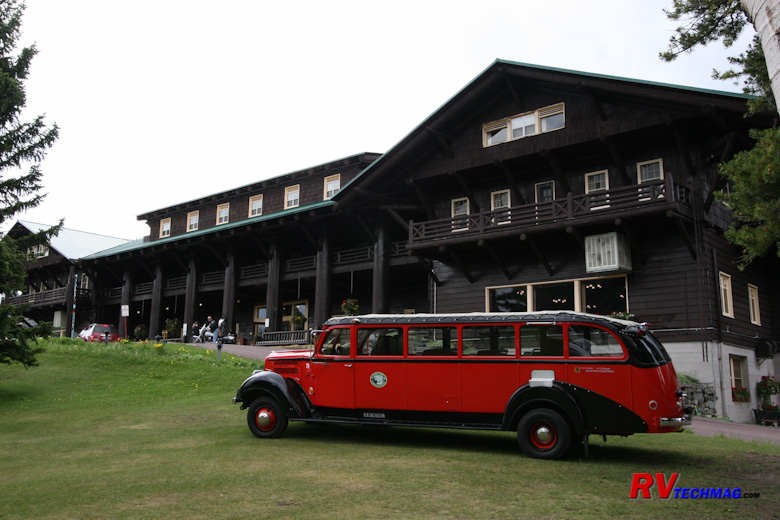
East Glacier Park Lodge was built by the Great Northern Railroad as a stop for early day travelers. Red busses, similar to the one shown in the
foreground, are available for tours for those who don't have their own vehicle
If you choose to stay on Glacier's east side then campgrounds around St Mary are the most popular. It's important to note that
highway 49 between Kiowa and East Glacier Park is a twisty climb over a mountain and RVs are prohibited on that road. If you plan on traveling with
your RV between East Glacier Park and St Mary you will need to travel to Browning and then up to St Mary rather than take the short cut.
|
US-89 is a great highway between Yellowstone and the Canadian border but the section between Browning and St Mary is a
challenge. You will be constantly be climbing over the rolling hills all the way and you'll encounter one switchback curve after the other.
It's certainly doable but not very relaxing and you will undoubtedly discover new creeks and rattles in your RV that you never found before.
A better alternative is a shortcut that we've discovered. Actually, it's a long cut in that it adds a few extra miles
to the trip but it's all smooth sailing at highway speeds and you'll arrive there in better shape than if you take the direct route over US-89.
To take this route leave US-89 in Browning and take highway 464 north. 464 is a good two lane blacktop road with gentle grades and very few curves.
Highway 464, also known as the Duck Lake road, makes a left turn and heads west past Duck Lake and meets up with US-89 just north of St Mary at
Babb.
|
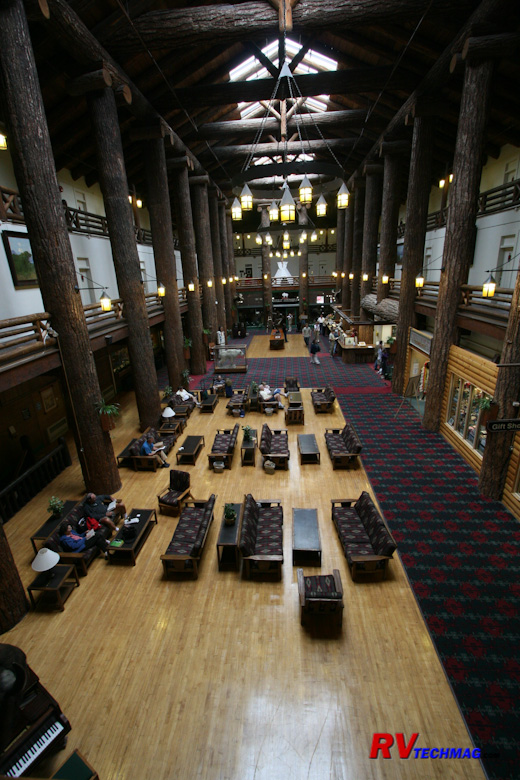
The interior lobby of East Glacier Park Lodge showcases the tall timbers that support the rustic alpine design typical to buildings
in Glacier National Park
|
|
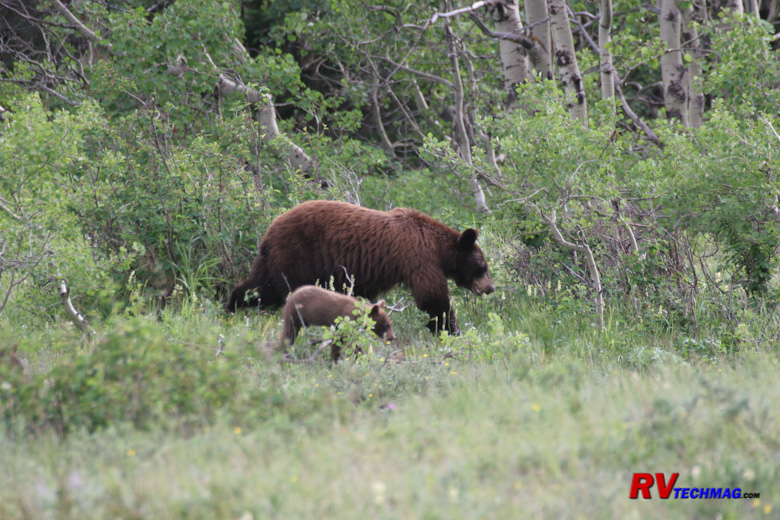
Glacier is well known for its excellent grizzly bear habitat
|
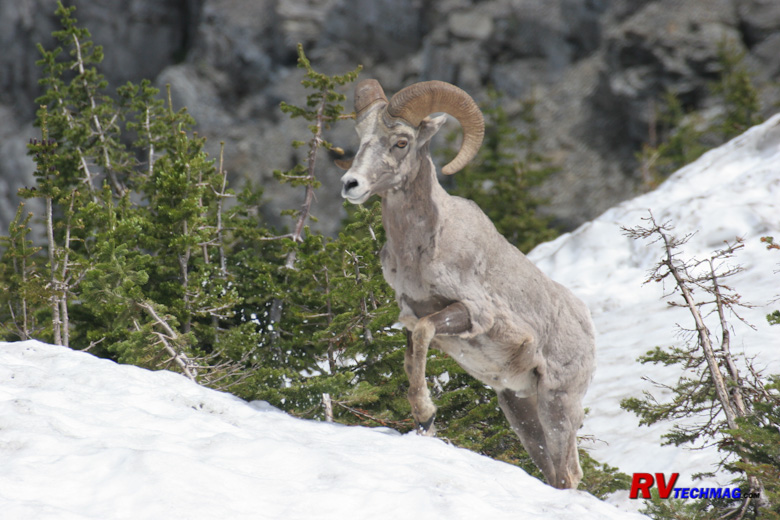
Bighorn Sheep ply the steep slopes of the high country, near Logan Pass. These sure footed animals have amazing traction and make
navigating the steep, rocky terrain look much easier than it really is
|
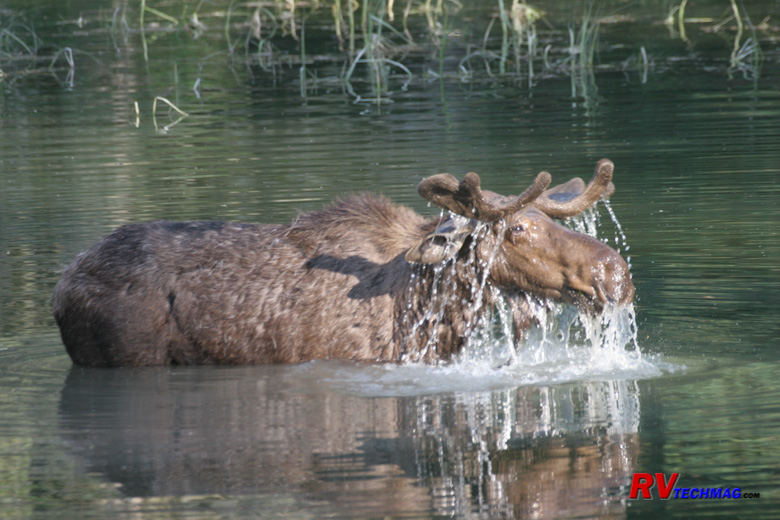
Moose browse for sedges found at the bottom of ponds and streams. During early summer the bull's antlers are covered in velvet and
are not fully grown until the fall rut in September
|
East Glacier Park
As in most of the national parks, initial development was led by the railroads. The Great Northern railroad laid track to the
area and built lodging, hopefully to entice tourists to travel by rail and stay at their lodges. On the southeast corner of Glacier, there was easy
access to their tracks so East Glacier Park was founded. Passengers disembarked at the rail depot and took other forms of transportation into the park.
East Glacier Park Lodge was built by the Great Northern Railroad to provide the kind of lodging accommodations these passengers were accustomed to
and was located immediately across the road from the depot.
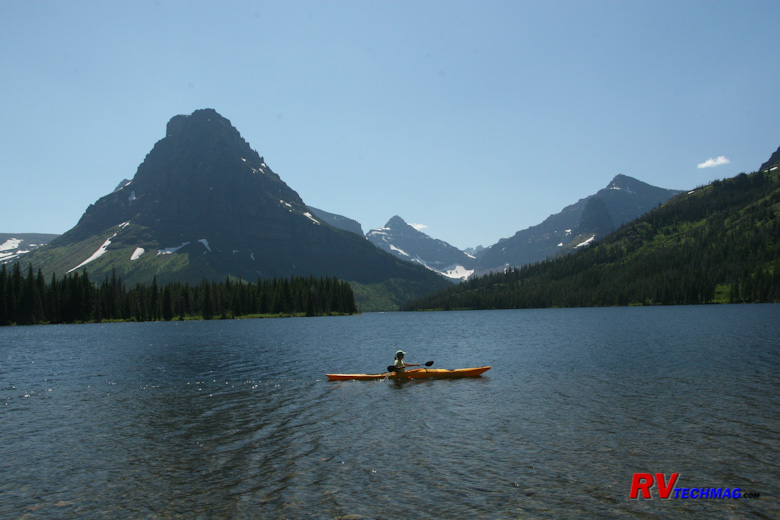
Two Medicine Lake is located near East Glacier Park and offers kayak rentals as well as a number of hiking trails
Many of the grand hotels and lodges constructed in the parks were designed to blend in with their surroundings. Local materials
were used extensively in their construction and the lodges were created to be upscale. The lobby of East Glacier Park Lodge shows the large pine
timbers used in it's construction. The balconies of the rooms in the main building all look out onto the lobby, which became a popular seating and
entertainment area, especially in the evenings when the grand piano was playing. Gift shops, restaurants, lounges, and tour services make up the public
rooms surrounding the first floor of the lobby.
East Glacier park has a number of tourist oriented businesses and it's a great location to see the Two Medicine area of the park.
Travel up the east side towards Kiowa is accomplished by driving over a mountain. This road is fine for passenger vehicles but RVs or trailers are not
allowed. US-2 passes right through town and will take you to the west side of the park or further eastward towards Cut Bank, Shelby and North Dakota.
A few back country trails head into the park from here but for the most part you'll be happier staying at West Glacier or St Mary to see the real beauty
of the park.
West Glacier
West Glacier is the western anchor of the park and is a great location to set up camp. Numerous RV parks and campgrounds are in
the area and continue to spread out through Hungry Horse and Columbia Falls.
|
If you can't find the service or merchandise that you need here a quick trip to Kalispell will take care of any need you
may have. A short hop over the Flathead River bridge gains you entry into the park. Apgar Village is dead ahead while Going to the Sun Road
begins on your right and takes you up into the park, across the divide and down to St Mary at its eastern end.
|
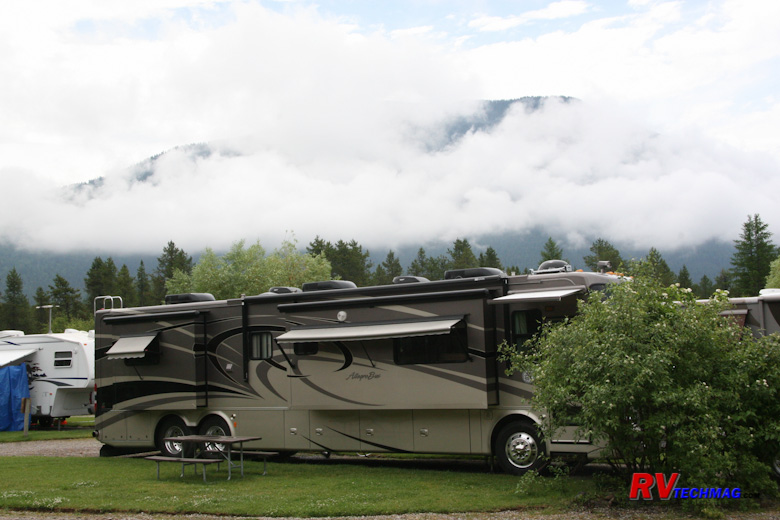
A number of RV parks can be found where you can nestle your RV into a scenic mountain setting
|
St. Mary and Babb
RV owners staying at Glacier's eastern end are best served by the many services at St Mary. Going to the Sun terminates here
and some of the best scenery in Glacier are closest to St Mary than any other location so it make a great choice for setting up your base camp while
you explore the park. US-89 heads north towards Babb.
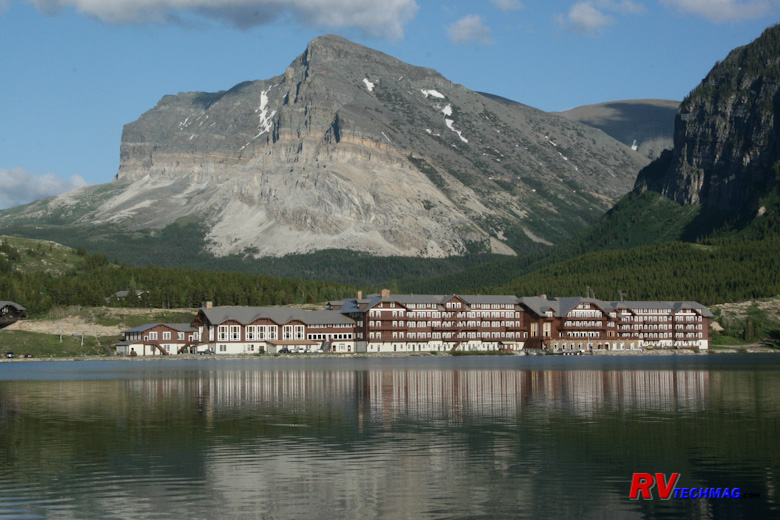
The alpine themed Many Glacier Hotel is located on the shores of Swiftcurrent Lake. This grand structure, built in 1915, is the largest lodging
facility in Glacier National Park
At Babb a spur road takes you into the park towards the Many Glacier area. Many Glacier Hotel is located on the shores of
Swiftcurrent Lake and a number of good hiking trails emanate from this area. A bit further and the road ends at Swiftcurrent Lodge. One little known
secret is a short hiking trail to Fishercap Lake where moose are frequently seen. It's not well marked but it's at the west end of the parking lot
and there's always a ranger around to point you in the right direction if you can't find it. It's a short and easy hike but very rewarding.
Going to the Sun Road
Naturally, wildlife viewing is always high on everyone's bucket list. Everyone wants to see a grizzly bear. Unfortunately,
not everyone does. The majority of the grizzlies are in the back country and you'll need to hike in to see them so you should be properly versed in
bear etiquette and carry bear spray. For those who really want to experience Glacier at its fullest, overnight hiking chalets are available for longer
backpacking trips. But one unique feature that everyone can see is Going to the Sun road.
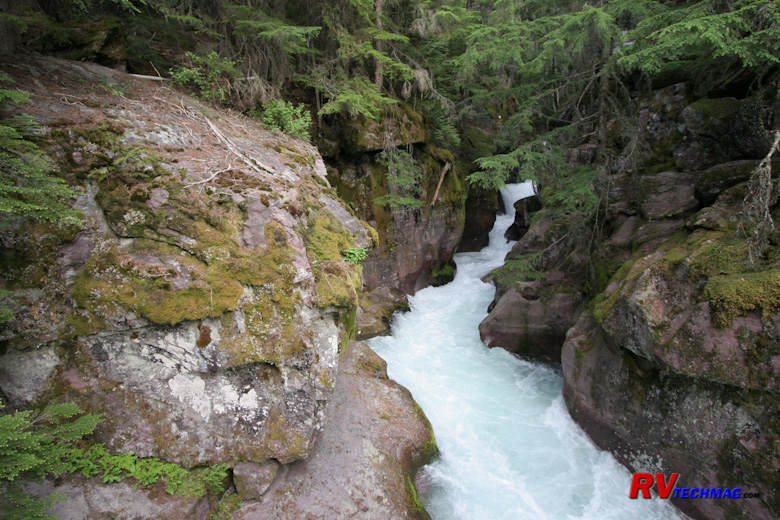
Small streams, like this one along Trail of the Cedars, are found all over the park
Going to the Sun road spans the park from east to west. It travels through valleys, alongside lakes and streams, climbs peaks,
hangs to the side of cliffs, and crosses the continental divide at Logan Pass. Snow melting from the surrounding peaks creates beautiful rushing
waterfalls and streams that will take your breath away. One summer we were standing on the edge of the road as it clung to the side of the mountain
and looking down at the top of a bald eagle, who was soaring far above the river below. That's the kind of spectacle you'll see on Going to the
Sun Road.
If you begin your journey at St Mary on the east side of the park you'll travel along the shores of St Mary Lake. An Osprey
nesting platform is located right at the visitors center and you'll undoubtedly see these amazing fishermen in the streams that feed St Mary Lake.
Numerous pullouts and parking areas afford the chance to explore the many cascades on the St Mary River as it passes through the valley. One
popular point of interest is Sunrift Gorge where a creek passes through a narrow slot in the rocks on its way to Bearing Falls. As you continue you'll
pass Jackson Glacier on your way to Siyeh Bend, where the waterfall passes through a tunnel cut beneath the road to allow unimpeded travel without
restricting the stream. Eventually the climb culminates at the Logan Pass Visitor Center. At Logan Pass the most popular hiking trail takes you
around Clements Mountain and on to Hidden Lake. There is heavy snowfall at this altitude and it melts slowly so chances are you'll need snowshoes
unless you wait until the end of July to take this trail. Those who do will be rewarded with an amazing view that few ever see.
|
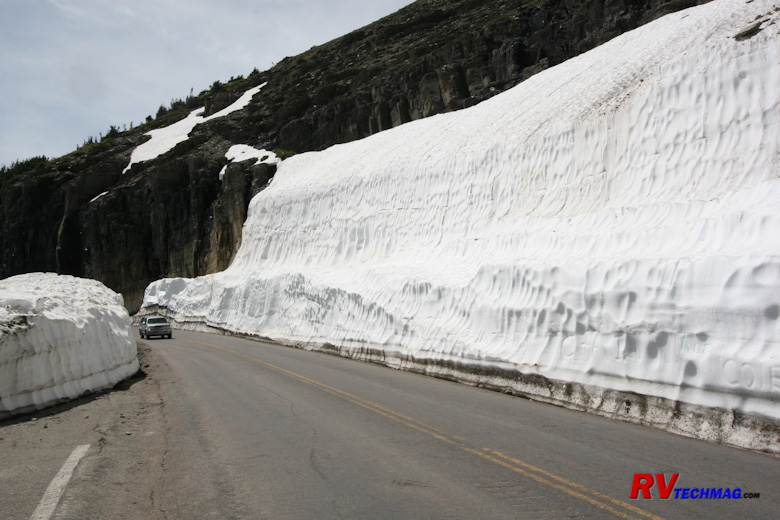
Snowfall at Glacier is substantial. The Big Drift is the last area to be cleared and requires a crew of dozers and snow blowers to
ready Going-to-the-Sun Road for through traffic every spring
|

Traffic jams are common whenever wildlife choose to cross the road. Allow plenty of time when traveling Going-to-the-Sun Road and be sure
to bring your camera
|
|
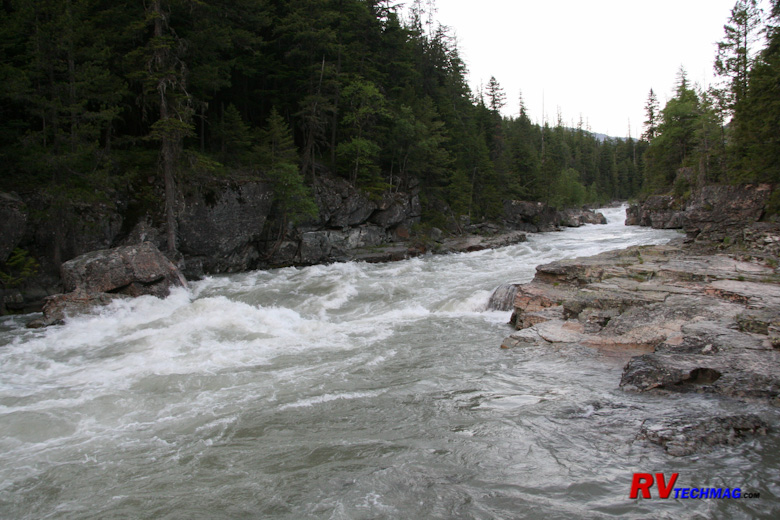
The St. Mary River rushes alongside Going to the Sun in its lower elevations
|
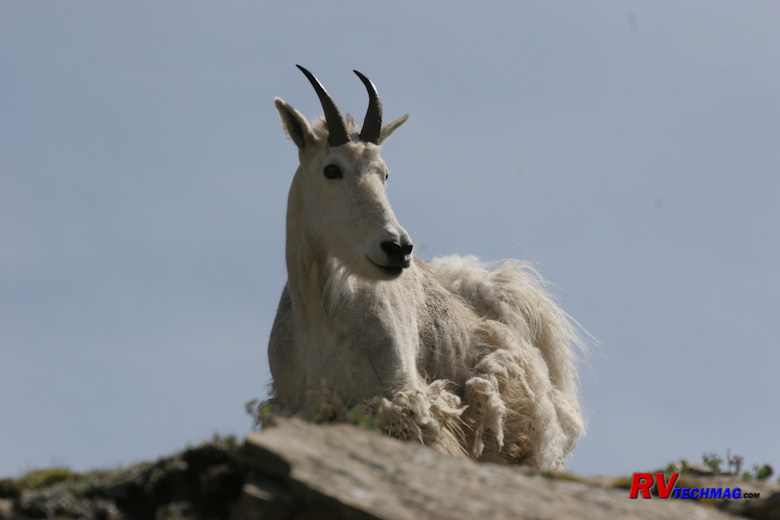
Mountain Goats range Glacier's high peaks and can be seen around Logan Pass
|
Continuing on down towards the west side you'll pass by the garden wall. When you leave Logan Pass keep your eye open for
Bighorn Sheep and Mountain Goats who tend to hang out between Logan Pass and the Garden Wall. They may traverse down from the steep slopes to the
valley below for water. Whenever they do, it's common to have a traffic jam as tourists block the roads hoping to get a photo. Be sure to allow
plenty of time for sightseeing and delays when traveling Going to the Sun.
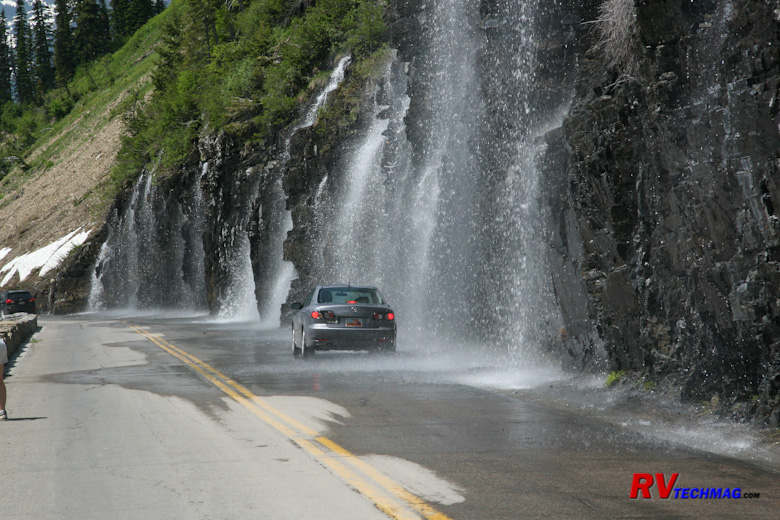
The constant water flow at the Weeping Wall can give you a free car wash
Shortly after you'll approach the Weeping Wall, which is where water from above penetrates the ground until it reaches an
impassible slab of rock. It then runs laterally until it washes out of the side of the cliff, directly next to the road. You can get a free car wash
if you pull over to one side. However, if you have a convertible I would suggest staying on the other side of the road. Traveling farther brings you
to the Big Drift, which is the very last place that the snow is removed from every spring. Removing snow from Going to the Sun is a monumental task
and many times the road does not open up to through traffic until the first week in July. The actual date varies according to how heavy the winter
snowfall was but the Big Drift is the last to get cleared.
|
After passing through The Loop the road begins its run down into the valley. The Trail of the Cedars is an excellent stop.
This interpretive trail takes you across a boardwalk path through a cedar forest. Various streams and fallen trees and mosses illustrate the
ecological effects of climate in a temperate rain forest zone. It's a short, flat walk that is wheelchair accessible. Nearby is Avalanche Creek.
This creek runs down from the mountains to the south and empties into Lake MacDonald. A hike up along the creek will take you all the way to
Sperry Glacier if you decide to venture that far while a short hike will take you to the shores of Lake MacDonald.
|
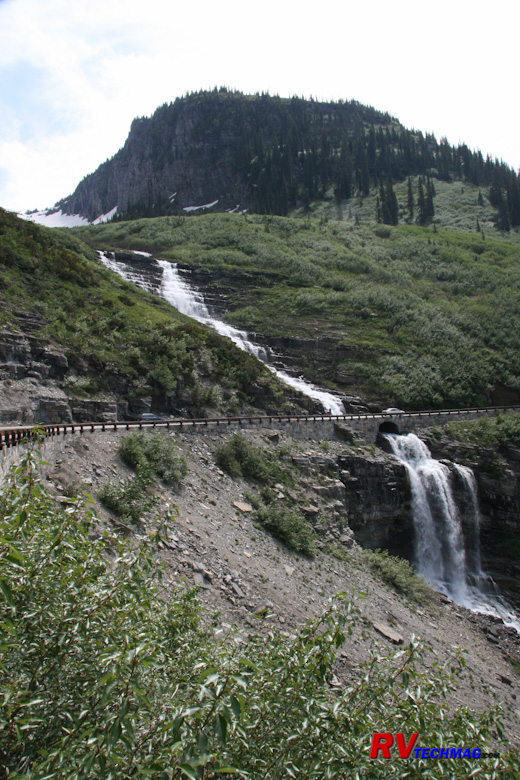
A large number of waterfalls will be found in Glacier due to the constant runoff from snow covered peaks. This waterfall, near Siyeh Bend,
is routed through a tunnel that allows it to pass through beneath the road
|
Last, but not least, you'll find Lake McDonald Lodge, which is situated on the shore, overlooking the lake. You can take a
tour boat tour of the lake from here or rent your own small outboard if you so desire. The lodge was built in 1914 and features a rustic charm
common to the Swiss Chalet styling common to most facilities in Glacier National Park. Continuing on the road will take you to Apgar Village and
then West Glacier.
Other Tips and Hints
Winter is severe at this altitude and latitude and it tends to stay a long time. Snow removal at Glacier takes some time so
Going to the Sun road may open around the 25th of June or it may open July 10th. You never know so it's best to plan your trip accordingly. Early
fall snows can close areas of the park in October so that leaves a small window of opportunity to visit the park. July and August are the biggest
tourist months at Glacier while September brings the fall season and smaller crowds but you always run the risk of an early snow messing up your plans.
It's best to have an open schedule when visiting the park. If you have enough time, consider staying on the west end of the
park for a few days and then shuttle over to the east end for the remainder of your visit. If your time is limited consider staying at one area. In
that case the east end is closer to the best scenery and will be the best choice for your base camp.
It really doesn't matter when you go, where you stay, or who you go with. You'll find Glacier to be a unique experience and one
that you'll always cherish in your memories.
|
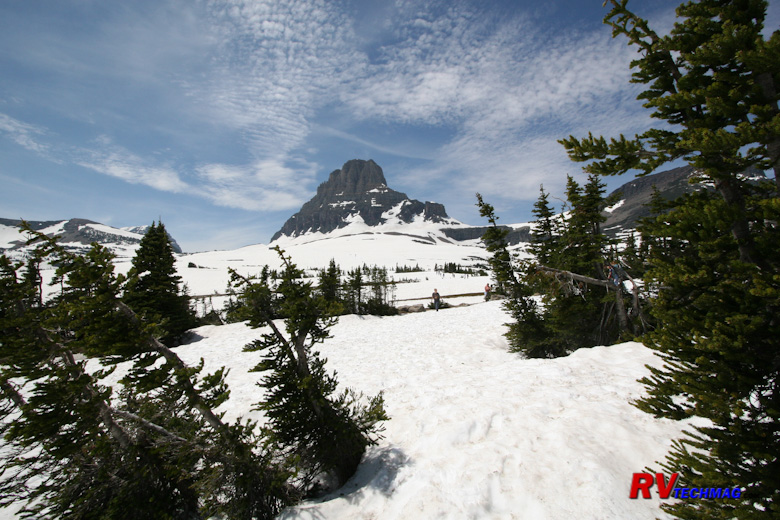
Mount Clements is located near Logan Pass, which is the summit for Going-to-the-Sun Road . Trails to Hidden Lake pass through this
area as they leave the Logan Pass visitor's center
|
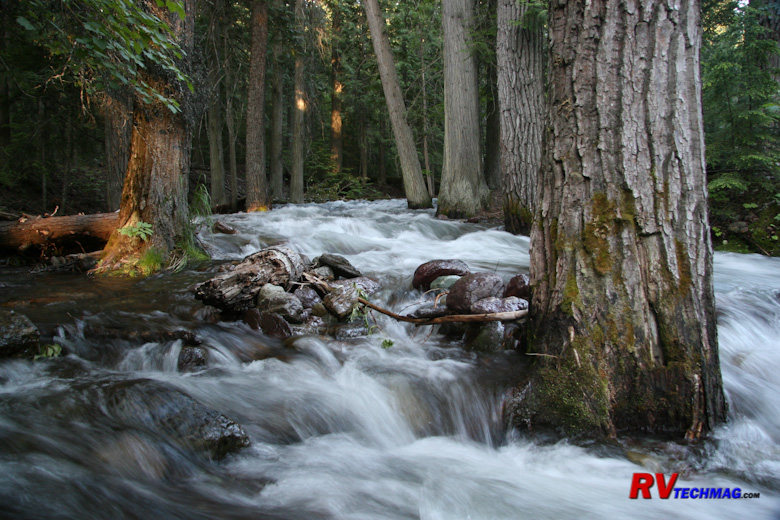
Avalanche Creek runs through the forested slopes on its way to Lake McDonald
|
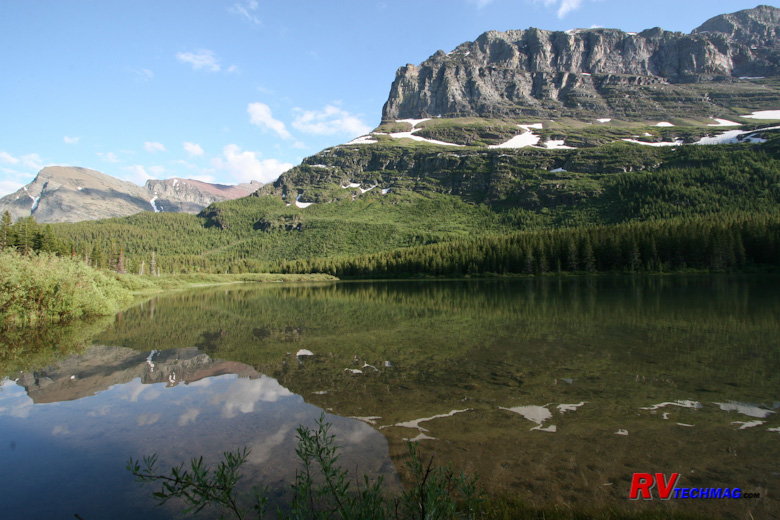
Fishercap Lake is a short hike from the Swiftcurrent Inn parking area. Moose are typically found at this location
|
Source
Return to Home Page
If you enjoyed this article be sure to recommend RVtechMag.com to your friends, like us on Facebook or Twitter
or subscribe to our RSS feed.



|

























